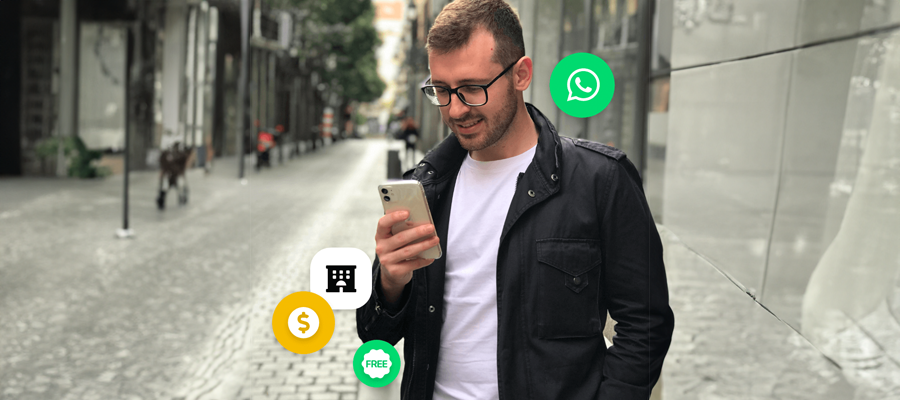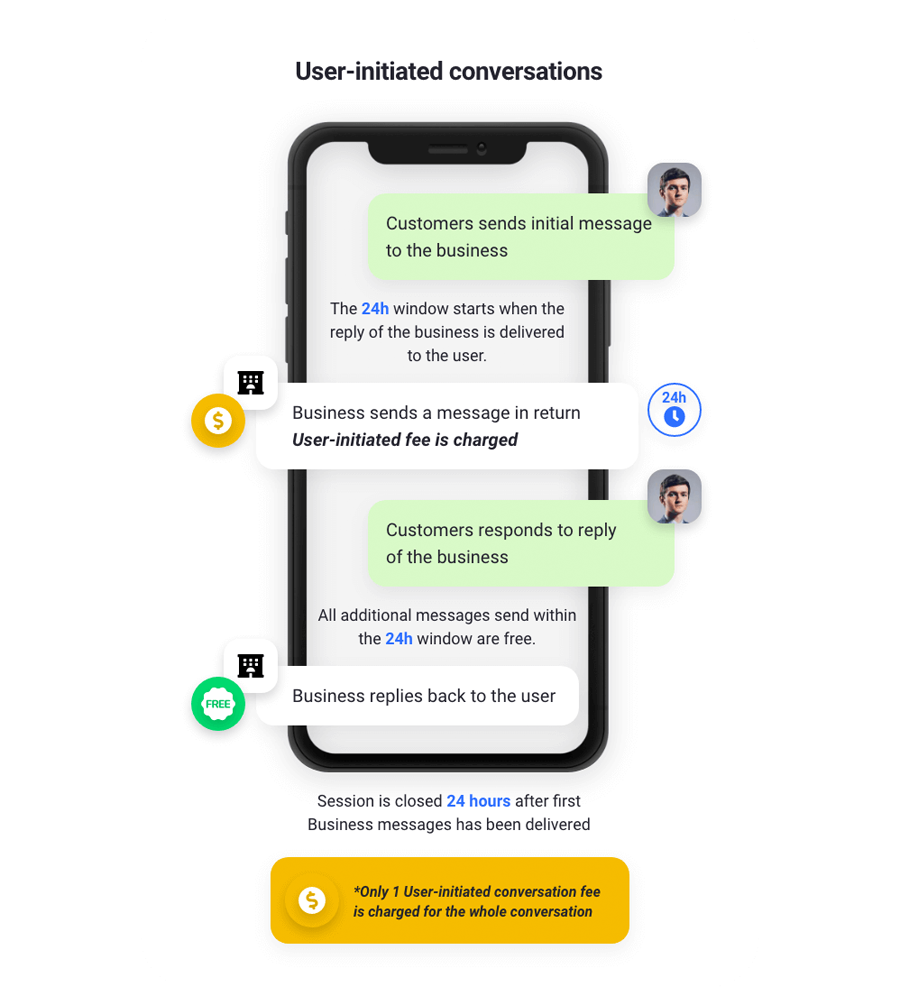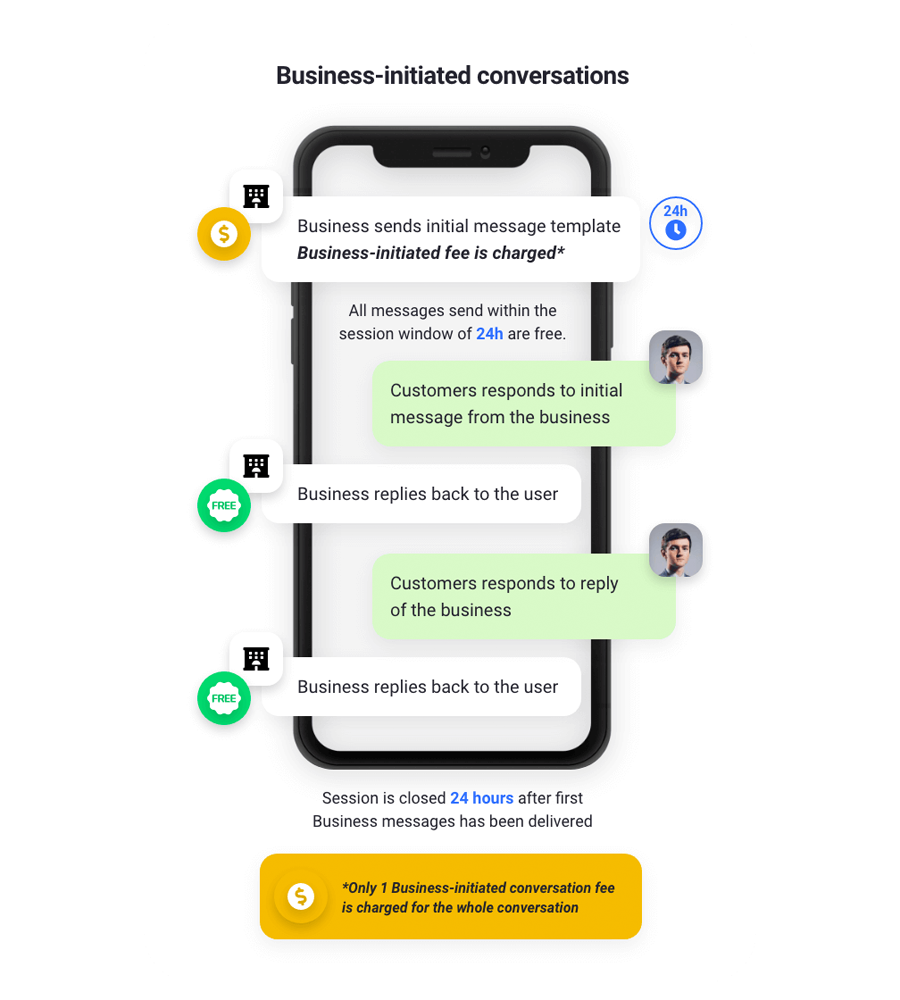What is WhatsApp conversation based pricing?

The launch of the WhatsApp Business API caused a ripple effect in the customer service sphere. More and more businesses are taking advantage of the messaging app that has a solid user base of 2 billion active users. WhatsApp Business entered the scene with message templates and, starting February 1st, 2022, a welcomed change is coming to its pricing model.
How does the new pricing model work?
WhatsApp will move from its current notification-based pricing model to a conversation-based pricing model. It’s an outcome based model that focuses on how the API is being used in customer service situations. This model assumes that customer service requests can be resolved within a 24-hour session. Meaning that businesses will now be charged per 24-hour session (i.e., conversation) rather than for notifications sent.
What is a conversation?
A conversation is simply a fixed 24-hour session that is initiated when the business sends a message. This can either be a ]proactive business-initiated message or a reply to a user-initiated message. Pricing in the new model is determined based on which type of conversation it is, either user- or business-initiated.
User-Initiated Conversations
Conversations started by customers fall under this type. Imagine a customer sends your business a message because they are looking for a product but can’t find it in the store. An hour later, one of your agents replies with a link to the product. Their response initiates the 24-hour session. Turns out, the customer had been looking in the wrong section for the product. The customer is satisfied with your agent’s response and ends the conversation.

In this situation, you will be charged for one (1) user-initiated conversation. Why? Because you were able to resolve a conversation within the 24-hour window.
💡 To be clear, the conversation starts when you respond to a customer inquiry. If you don’t respond to the incoming message, no session is opened and there is no charge. This is true for both customer and spam messages. Unless of course you have auto-replies set up: if an auto-reply is sent to an incoming spam message, you will be charged for a user initiated conversation.
Business-Initiated Conversations
This type of conversation is slightly more complex, but we’ll walk you through it.
Imagine a customer sends you a message on a Monday morning, requesting a status update on an order. An agent replies, starting a 24-hour session, and provides a status update. The customer is satisfied with the response and the session expires after 24 hours.

On Tuesday afternoon, your business sends the same customer a delivery update using a message template. This outgoing notification initiates a new 24-hour session. In this situation, you will be charged for one (1) user-initiated conversation and one (1) business-initiated conversation. Why? Well, when you responded to the initial customer request, you were able to resolve it within the first 24-hour session. However, a few hours after that initial session expired, you initiated a new conversation (thus, a new 24-hour session).
💡 You won’t incur double costs if your first response to an inquiry is after 24 hours. Remember that a business-initiated conversation is charged from the moment you send a message, whether a customer messaged you 25 hours ago or 2 weeks ago.
Before we go into the costs, let’s talk about an added benefit applied to WhatsApp Business Accounts:
The first 1,000 conversations per registered WhatsApp Business Account are free! This means that businesses just starting out can start setting up and building out their messaging strategy before they have to pay anything. These free conversations include both customer- and business-initiated conversations.
💡 Keep in mind that the free 1,000 doesn’t take phone numbers into consideration. This means that if you have multiple conversations with the same customer within the first 1,000 free messages, they will be considered separate conversations.
What does conversation-based pricing actually cost?
The cost for conversations is based on the user’s phone number, defined by their country code. This is true for both customer- and business-initiated conversations, though the rates differ, respectively. The rates vary by market. For a full list of rates for customer- and business-initiated conversations per country/region, see Facebook’s pricing here.
The Bottom Line
WhatsApp’s monetization strategy provides a more thoughtful pricing model to more closely fit with their customers’ needs. This shift is a welcomed update to help you create a seamless customer experience.
Looking for more information about how to implement WhatsApp Business into your communications strategy? Contact us today to schedule a demo.
About Saysimple
Saysimple provides a single platform that allows you to integrate your customers’ preferred messaging channels to streamline your customer service efforts. Our Team Inbox allows you to enjoy closer collaboration, effective workflows, and more satisfied customers.









